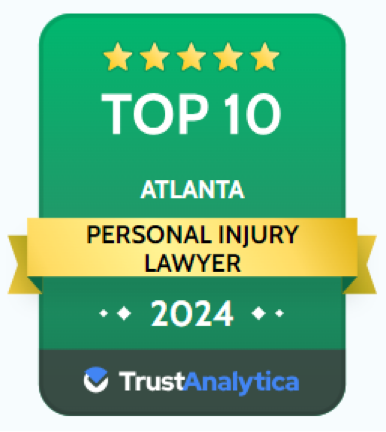All information provided about the law is very general in nature and should not be relied upon as legal advice. Every situation is different and should be analyzed by a lawyer who can provide individualized advice based on the facts involved in your unique situation, and a consideration of all of the nuances of the statutes and case law that apply at the time.
Can Cell Phone Data Be Used As Evidence In A PI Case?
Cell phones do more than keep us connected — they’re portable data hubs that track much of our daily activity. From texting and navigation to photos and location history, these devices store a surprising amount of information.
In the aftermath of a car accident, cell phone data can quickly become a key piece of evidence in a personal injury (PI) case. Cell phone evidence can reveal where someone was, what they were doing, and even how fast they were going.
Your cell phone gathers more information than you might think. Every call made, text sent, app opened, or GPS route followed is recorded in some way and in a personal injury case, that data can tell a compelling story about what happened before, during, and after the incident.
Can my cell phone data be subpoenaed without my knowledge? Can a cell phone be used as evidence in court? Can mobile phone video be used as evidence in court? We’ll answer these questions and more as we break down how cell phone data can impact your personal injury claim.
What Data Does Your Phone Collect?
If you suspect the other driver was texting or using their phone at the time of the crash, phone and text records could help prove negligence. An attorney can subpoena these records as part of your case under O.C.G.A § 9‑11‑34, which allows attorneys to obtain documents, including electronic data, that are directly related to a case. Just keep in mind — your own mobile activity can also be reviewed by the opposing party.
Because this data may only be available for a limited time, it’s important to act quickly. If you’ve been involved in an accident, contact an experienced personal injury attorney as soon as possible.
Common Types of Phone Evidence
- Call and text logs to determine if either driver was using a phone during the collision.
- GPS/location data tracks movement and speed at the time of the impact.
- App usage logs show if someone was texting, scrolling, or interacting with the phone just before the collision.
- Photos and videos can provide visual evidence of injuries, damage, road conditions, and location.
Depending on the circumstances, cell phone evidence can either support your claim or weaken it. For instance, if you’re accused of causing a crash but your GPS data shows you were stopped at a red light, that could help your case. On the other hand, if there’s evidence you were texting while driving, it could be used against you as cell phone evidence in court.
What Can Cell Phone Data Be Used To Prove?
Cell phone data can play a critical role in a personal injury case, particularly when a car accident is involved. It can help clarify key details about what happened before, during, and after a crash. Below are some of the main things this data can help prove:
Whether distracted driving was a factor
Distracted driving is one of the leading causes of car accidents. Georgia’s Hands‑Free Law, O.C.G.A. § 40‑6‑241 prohibits holding or physically supporting a phone while driving. Phone records showing calls or texts at the time of impact can be used to prove a violation of this statute—and by extension, negligence. According to the National Highway Traffic Safety Administration (NHTSA), it was responsible for 3,275 fatalities in 2023. Cell phone data can reveal whether a driver was actively using their device at the time of the crash such as texting, browsing the internet, using social media, reading an email, or interacting with an app. Legal teams often seek this information to establish negligence.
The timeline of events
Cell phones automatically log data, making them useful for creating a detailed timeline of events. GPS data and app usage can help determine where a driver was, what they were doing, and how their movements led up to the collision. This can be especially helpful when reconstructing the accident.
Speed and acceleration
Many smartphones contain sensors and accelerometers that track motion, including speed and changes in acceleration. This data can be used to determine whether a driver was speeding, braking suddenly, or driving erratically, helping to prove or disprove reckless behavior.
Location of the crash
In some accidents, vehicles may end up far from the actual point of impact, making it hard to determine where the crash occurred. Cell phone location data can pinpoint the precise location of the incident and track the movements leading up to it. This can also help clarify how the crash happened and where fault potentially lies.
Verifying witness testimony
Witnesses often play a key role in personal injury cases, but their accounts can be challenged. Cell phone data can support or contradict these testimonies. For example, if a witness claims to have seen the glow of a phone screen just before impact, usage logs can confirm whether the device was active at that moment.
Can Phone Records Be Used In Court?
Yes—but not automatically. Under Georgia Code § 24‑13‑21, phone records can only be obtained through a valid subpoena, court order, or with your consent. This law protects your privacy by requiring that any request for data go through the proper legal process.
If the opposing attorney seeks your phone records, the request must be narrowly focused and directly related to the case. If it’s too broad or intrusive, your lawyer can object and ask the court to limit what’s disclosed.
Georgia’s Evidence Code § 24‑4‑401 also requires that any information admitted in court be “relevant” – meaning it must make a fact more or less likely to be true. If phone data doesn’t meet this standard, it can be excluded.
If your cell phone data becomes part of a personal injury case, your attorney will guide you through every step – making sure your rights are protected while also using the information to strengthen your claim when appropriate.
Can Insurance Companies Request Access to Your Phone Records?
You are under no obligation to provide your phone records to an insurance adjuster. Insurance companies often ask for phone records after a crash, claiming it’s part of their investigation. However, they cannot access that data without your permission or a court order.
Why they might ask
Insurers sometimes request phone records to try and shift blame or reduce their financial liability. For instance, if they can show you were using your phone at the time of the crash, they may argue that you were distracted and partially at fault, potentially lowering your compensation.
Protect yourself by speaking with a lawyer
If you receive a request for your phone data, it’s crucial to consult an attorney before responding, Even something that seems harmless could later be used to weaken your claim. Your attorney can review any request, determine if it’s legally valid, and handle all communication with the insurance company on your behalf.
What To Do If You’re Asked For Phone Records
If an insurance adjuster or the other party’s attorney asks for your phone records, don’t panic and don’t hand anything over without legal guidance. Your attorney can object to overly broad or irrelevant requests and ensure that only appropriate information is shared, if any.
You don’t have to handle this alone. Instead, take a moment and follow these three steps:
- Call your attorney.
Let your lawyer review the request and advise you on whether it’s appropriate. They can handle any legal pushback and protect your rights. - Preserve everything.
Do not delete messages, call logs, or any other data. Altering or deleting information (even if unintentional) could appear suspicious and potentially hurt your case. - Stay off social media.
Posts can be taken out of context or used to undermine your claim. It’s best to avoid sharing anything publicly until your case is resolved. More on this below.
Be Mindful of Post-Accident Phone Use
One thing many people overlook is: your phone activity after the accident matters, too.
For example, if your cell phone evidence shows a post of yourself out at dinner or engaging in physical activity, and your injury claim says you’re in pain or unable to work, that post could be used to challenge your credibility, even if it’s unrelated or taken out of context.
Keep your social media accounts private, avoid posting about the accident and your injuries, and if you’re ever in doubt – don’t post. Small decisions after an accident can have a big impact on your case.
It’s not about hiding the truth. It’s about being cautious with how your digital presence may be interpreted. If you have already posted to social media regarding your accident, don’t delete it – make it private and don’t post again.
Don’t Let Your Phone Data Work Against You – Call Montlick Today
At Montlick, we’ve spent over 40 years helping car accident victims across Georgia and the Southeast navigate complex personal injury claims — including those involving cell phone evidence. We know how to uncover key facts, protect your rights, challenge improper subpoenas, and push back when insurance companies or opposing counsel overreach.
Our mission is clear: to fight for the full and fair compensation you deserve. While you focus on healing, we focus on holding negligent parties accountable and securing the resources you need to move forward.
Don’t take chances with your case — or your data. Contact Montlick today for a free consultation and learn how we can make a difference in your recovery.
How useful is this for you?
Would you like to speak with an attorney?
Call NowRelated Questions
- What Are the Long-Term Impacts of Car Accidents?
- Can I Get Compensation for Anxiety After a Car Accident?
- How Long Will My Georgia Car Accident Case Take?
- How Can a Personal Injury Attorney Get Me More Compensation After a Car Accident?
- Can I Get Traffic Camera Footage of My Car Accident in Georgia?
We Win More than Settlements.
We win the peace-of-mind you need to get your life back.
At Montlick, we believe comprehensive legal representation is a right, not a privilege. That’s why we provide our services on a contingency fee basis. You only pay when we win.









